Organizational Behaviour: Theories, Skills, and Modern Practices
VerifiedAdded on 2020/02/18
|7
|1592
|319
Essay
AI Summary
This essay delves into the multifaceted realm of organizational behaviour, examining its core theories and practical applications within modern business contexts. It begins by outlining various theoretical frameworks, including scientific leadership, human resource approaches, decision-making models, neo-human relations, and systems approaches, providing a comprehensive understanding of how organizations function. The essay further explores different types of organizational behaviour, contrasting profit and non-profit organizations, and emphasizing the significance of aligning employee behaviour with organizational goals. A key focus is placed on the importance of an evidence-based approach to organizational development, highlighting its role in enhancing competitive advantage and informing decision-making processes. Furthermore, the essay underscores the critical role of personal and interpersonal skills, such as teamwork, decision-making, and crisis management, in driving both individual and organizational performance. The importance of teamwork is discussed, and the role of organizational behaviour theories in guiding business leaders towards effective organizational operations is also emphasized. In conclusion, the essay underscores the critical role of organizational behaviour theories in navigating the complexities of contemporary business environments. The provided references include a comprehensive list of sources, including academic journals and books, which can be used to further explore the subject matter.

Running head: ORGANIZATIONAL BEHAVIOUR
Organizational Behaviour
Name of the Student
Name of the University
Author Note:
Organizational Behaviour
Name of the Student
Name of the University
Author Note:
Paraphrase This Document
Need a fresh take? Get an instant paraphrase of this document with our AI Paraphraser
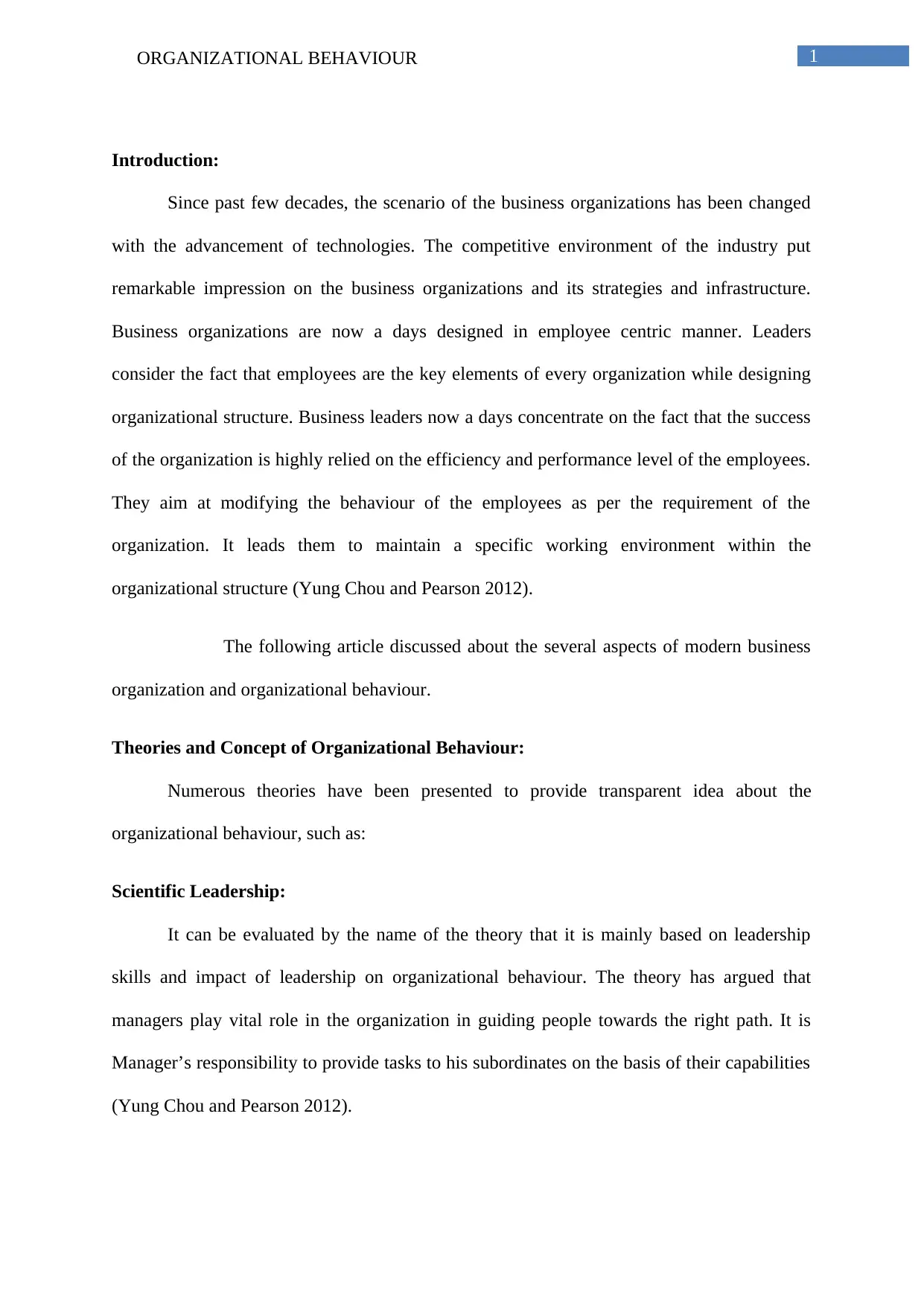
1ORGANIZATIONAL BEHAVIOUR
Introduction:
Since past few decades, the scenario of the business organizations has been changed
with the advancement of technologies. The competitive environment of the industry put
remarkable impression on the business organizations and its strategies and infrastructure.
Business organizations are now a days designed in employee centric manner. Leaders
consider the fact that employees are the key elements of every organization while designing
organizational structure. Business leaders now a days concentrate on the fact that the success
of the organization is highly relied on the efficiency and performance level of the employees.
They aim at modifying the behaviour of the employees as per the requirement of the
organization. It leads them to maintain a specific working environment within the
organizational structure (Yung Chou and Pearson 2012).
The following article discussed about the several aspects of modern business
organization and organizational behaviour.
Theories and Concept of Organizational Behaviour:
Numerous theories have been presented to provide transparent idea about the
organizational behaviour, such as:
Scientific Leadership:
It can be evaluated by the name of the theory that it is mainly based on leadership
skills and impact of leadership on organizational behaviour. The theory has argued that
managers play vital role in the organization in guiding people towards the right path. It is
Manager’s responsibility to provide tasks to his subordinates on the basis of their capabilities
(Yung Chou and Pearson 2012).
Introduction:
Since past few decades, the scenario of the business organizations has been changed
with the advancement of technologies. The competitive environment of the industry put
remarkable impression on the business organizations and its strategies and infrastructure.
Business organizations are now a days designed in employee centric manner. Leaders
consider the fact that employees are the key elements of every organization while designing
organizational structure. Business leaders now a days concentrate on the fact that the success
of the organization is highly relied on the efficiency and performance level of the employees.
They aim at modifying the behaviour of the employees as per the requirement of the
organization. It leads them to maintain a specific working environment within the
organizational structure (Yung Chou and Pearson 2012).
The following article discussed about the several aspects of modern business
organization and organizational behaviour.
Theories and Concept of Organizational Behaviour:
Numerous theories have been presented to provide transparent idea about the
organizational behaviour, such as:
Scientific Leadership:
It can be evaluated by the name of the theory that it is mainly based on leadership
skills and impact of leadership on organizational behaviour. The theory has argued that
managers play vital role in the organization in guiding people towards the right path. It is
Manager’s responsibility to provide tasks to his subordinates on the basis of their capabilities
(Yung Chou and Pearson 2012).
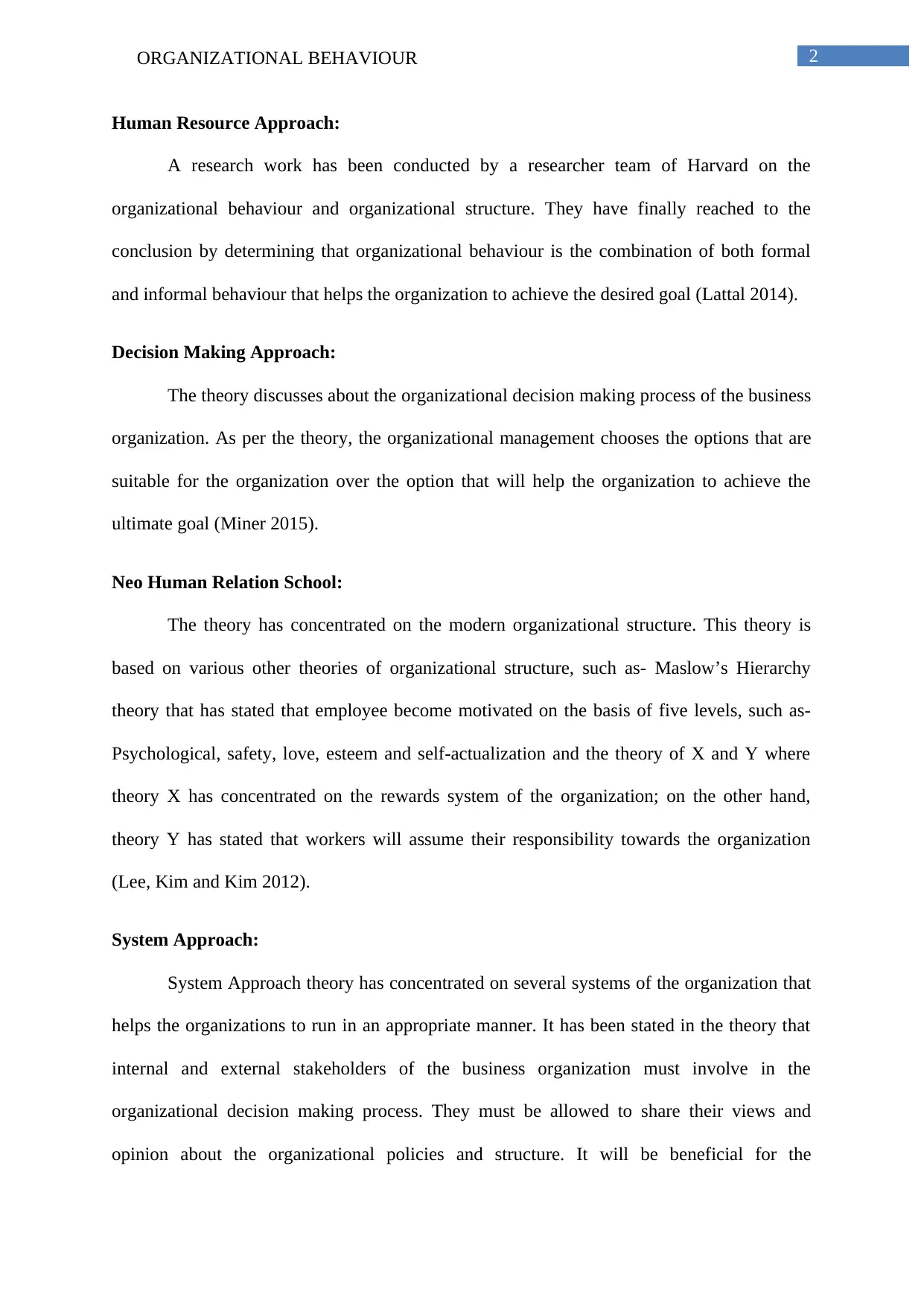
2ORGANIZATIONAL BEHAVIOUR
Human Resource Approach:
A research work has been conducted by a researcher team of Harvard on the
organizational behaviour and organizational structure. They have finally reached to the
conclusion by determining that organizational behaviour is the combination of both formal
and informal behaviour that helps the organization to achieve the desired goal (Lattal 2014).
Decision Making Approach:
The theory discusses about the organizational decision making process of the business
organization. As per the theory, the organizational management chooses the options that are
suitable for the organization over the option that will help the organization to achieve the
ultimate goal (Miner 2015).
Neo Human Relation School:
The theory has concentrated on the modern organizational structure. This theory is
based on various other theories of organizational structure, such as- Maslow’s Hierarchy
theory that has stated that employee become motivated on the basis of five levels, such as-
Psychological, safety, love, esteem and self-actualization and the theory of X and Y where
theory X has concentrated on the rewards system of the organization; on the other hand,
theory Y has stated that workers will assume their responsibility towards the organization
(Lee, Kim and Kim 2012).
System Approach:
System Approach theory has concentrated on several systems of the organization that
helps the organizations to run in an appropriate manner. It has been stated in the theory that
internal and external stakeholders of the business organization must involve in the
organizational decision making process. They must be allowed to share their views and
opinion about the organizational policies and structure. It will be beneficial for the
Human Resource Approach:
A research work has been conducted by a researcher team of Harvard on the
organizational behaviour and organizational structure. They have finally reached to the
conclusion by determining that organizational behaviour is the combination of both formal
and informal behaviour that helps the organization to achieve the desired goal (Lattal 2014).
Decision Making Approach:
The theory discusses about the organizational decision making process of the business
organization. As per the theory, the organizational management chooses the options that are
suitable for the organization over the option that will help the organization to achieve the
ultimate goal (Miner 2015).
Neo Human Relation School:
The theory has concentrated on the modern organizational structure. This theory is
based on various other theories of organizational structure, such as- Maslow’s Hierarchy
theory that has stated that employee become motivated on the basis of five levels, such as-
Psychological, safety, love, esteem and self-actualization and the theory of X and Y where
theory X has concentrated on the rewards system of the organization; on the other hand,
theory Y has stated that workers will assume their responsibility towards the organization
(Lee, Kim and Kim 2012).
System Approach:
System Approach theory has concentrated on several systems of the organization that
helps the organizations to run in an appropriate manner. It has been stated in the theory that
internal and external stakeholders of the business organization must involve in the
organizational decision making process. They must be allowed to share their views and
opinion about the organizational policies and structure. It will be beneficial for the
⊘ This is a preview!⊘
Do you want full access?
Subscribe today to unlock all pages.

Trusted by 1+ million students worldwide
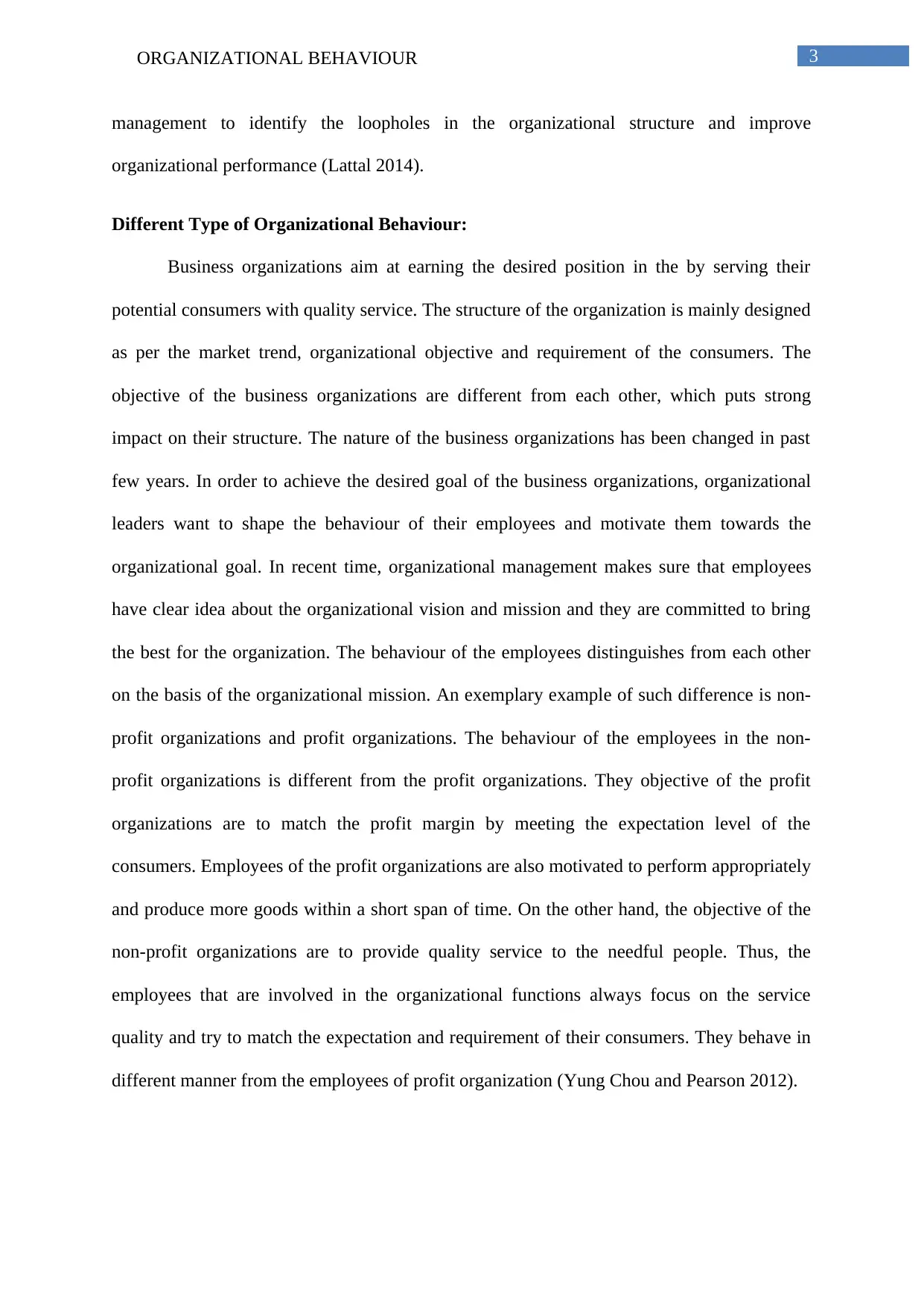
3ORGANIZATIONAL BEHAVIOUR
management to identify the loopholes in the organizational structure and improve
organizational performance (Lattal 2014).
Different Type of Organizational Behaviour:
Business organizations aim at earning the desired position in the by serving their
potential consumers with quality service. The structure of the organization is mainly designed
as per the market trend, organizational objective and requirement of the consumers. The
objective of the business organizations are different from each other, which puts strong
impact on their structure. The nature of the business organizations has been changed in past
few years. In order to achieve the desired goal of the business organizations, organizational
leaders want to shape the behaviour of their employees and motivate them towards the
organizational goal. In recent time, organizational management makes sure that employees
have clear idea about the organizational vision and mission and they are committed to bring
the best for the organization. The behaviour of the employees distinguishes from each other
on the basis of the organizational mission. An exemplary example of such difference is non-
profit organizations and profit organizations. The behaviour of the employees in the non-
profit organizations is different from the profit organizations. They objective of the profit
organizations are to match the profit margin by meeting the expectation level of the
consumers. Employees of the profit organizations are also motivated to perform appropriately
and produce more goods within a short span of time. On the other hand, the objective of the
non-profit organizations are to provide quality service to the needful people. Thus, the
employees that are involved in the organizational functions always focus on the service
quality and try to match the expectation and requirement of their consumers. They behave in
different manner from the employees of profit organization (Yung Chou and Pearson 2012).
management to identify the loopholes in the organizational structure and improve
organizational performance (Lattal 2014).
Different Type of Organizational Behaviour:
Business organizations aim at earning the desired position in the by serving their
potential consumers with quality service. The structure of the organization is mainly designed
as per the market trend, organizational objective and requirement of the consumers. The
objective of the business organizations are different from each other, which puts strong
impact on their structure. The nature of the business organizations has been changed in past
few years. In order to achieve the desired goal of the business organizations, organizational
leaders want to shape the behaviour of their employees and motivate them towards the
organizational goal. In recent time, organizational management makes sure that employees
have clear idea about the organizational vision and mission and they are committed to bring
the best for the organization. The behaviour of the employees distinguishes from each other
on the basis of the organizational mission. An exemplary example of such difference is non-
profit organizations and profit organizations. The behaviour of the employees in the non-
profit organizations is different from the profit organizations. They objective of the profit
organizations are to match the profit margin by meeting the expectation level of the
consumers. Employees of the profit organizations are also motivated to perform appropriately
and produce more goods within a short span of time. On the other hand, the objective of the
non-profit organizations are to provide quality service to the needful people. Thus, the
employees that are involved in the organizational functions always focus on the service
quality and try to match the expectation and requirement of their consumers. They behave in
different manner from the employees of profit organization (Yung Chou and Pearson 2012).
Paraphrase This Document
Need a fresh take? Get an instant paraphrase of this document with our AI Paraphraser
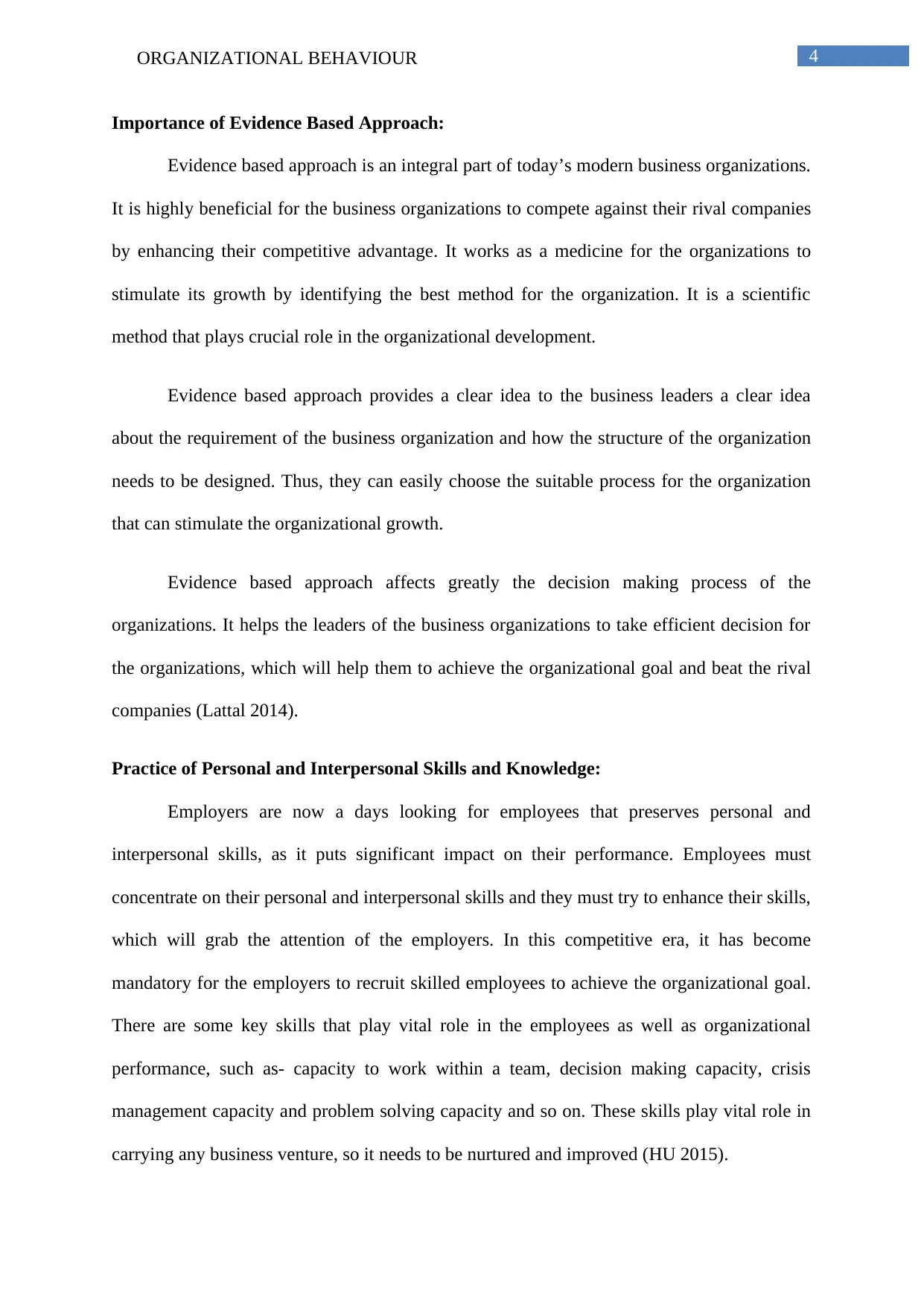
4ORGANIZATIONAL BEHAVIOUR
Importance of Evidence Based Approach:
Evidence based approach is an integral part of today’s modern business organizations.
It is highly beneficial for the business organizations to compete against their rival companies
by enhancing their competitive advantage. It works as a medicine for the organizations to
stimulate its growth by identifying the best method for the organization. It is a scientific
method that plays crucial role in the organizational development.
Evidence based approach provides a clear idea to the business leaders a clear idea
about the requirement of the business organization and how the structure of the organization
needs to be designed. Thus, they can easily choose the suitable process for the organization
that can stimulate the organizational growth.
Evidence based approach affects greatly the decision making process of the
organizations. It helps the leaders of the business organizations to take efficient decision for
the organizations, which will help them to achieve the organizational goal and beat the rival
companies (Lattal 2014).
Practice of Personal and Interpersonal Skills and Knowledge:
Employers are now a days looking for employees that preserves personal and
interpersonal skills, as it puts significant impact on their performance. Employees must
concentrate on their personal and interpersonal skills and they must try to enhance their skills,
which will grab the attention of the employers. In this competitive era, it has become
mandatory for the employers to recruit skilled employees to achieve the organizational goal.
There are some key skills that play vital role in the employees as well as organizational
performance, such as- capacity to work within a team, decision making capacity, crisis
management capacity and problem solving capacity and so on. These skills play vital role in
carrying any business venture, so it needs to be nurtured and improved (HU 2015).
Importance of Evidence Based Approach:
Evidence based approach is an integral part of today’s modern business organizations.
It is highly beneficial for the business organizations to compete against their rival companies
by enhancing their competitive advantage. It works as a medicine for the organizations to
stimulate its growth by identifying the best method for the organization. It is a scientific
method that plays crucial role in the organizational development.
Evidence based approach provides a clear idea to the business leaders a clear idea
about the requirement of the business organization and how the structure of the organization
needs to be designed. Thus, they can easily choose the suitable process for the organization
that can stimulate the organizational growth.
Evidence based approach affects greatly the decision making process of the
organizations. It helps the leaders of the business organizations to take efficient decision for
the organizations, which will help them to achieve the organizational goal and beat the rival
companies (Lattal 2014).
Practice of Personal and Interpersonal Skills and Knowledge:
Employers are now a days looking for employees that preserves personal and
interpersonal skills, as it puts significant impact on their performance. Employees must
concentrate on their personal and interpersonal skills and they must try to enhance their skills,
which will grab the attention of the employers. In this competitive era, it has become
mandatory for the employers to recruit skilled employees to achieve the organizational goal.
There are some key skills that play vital role in the employees as well as organizational
performance, such as- capacity to work within a team, decision making capacity, crisis
management capacity and problem solving capacity and so on. These skills play vital role in
carrying any business venture, so it needs to be nurtured and improved (HU 2015).
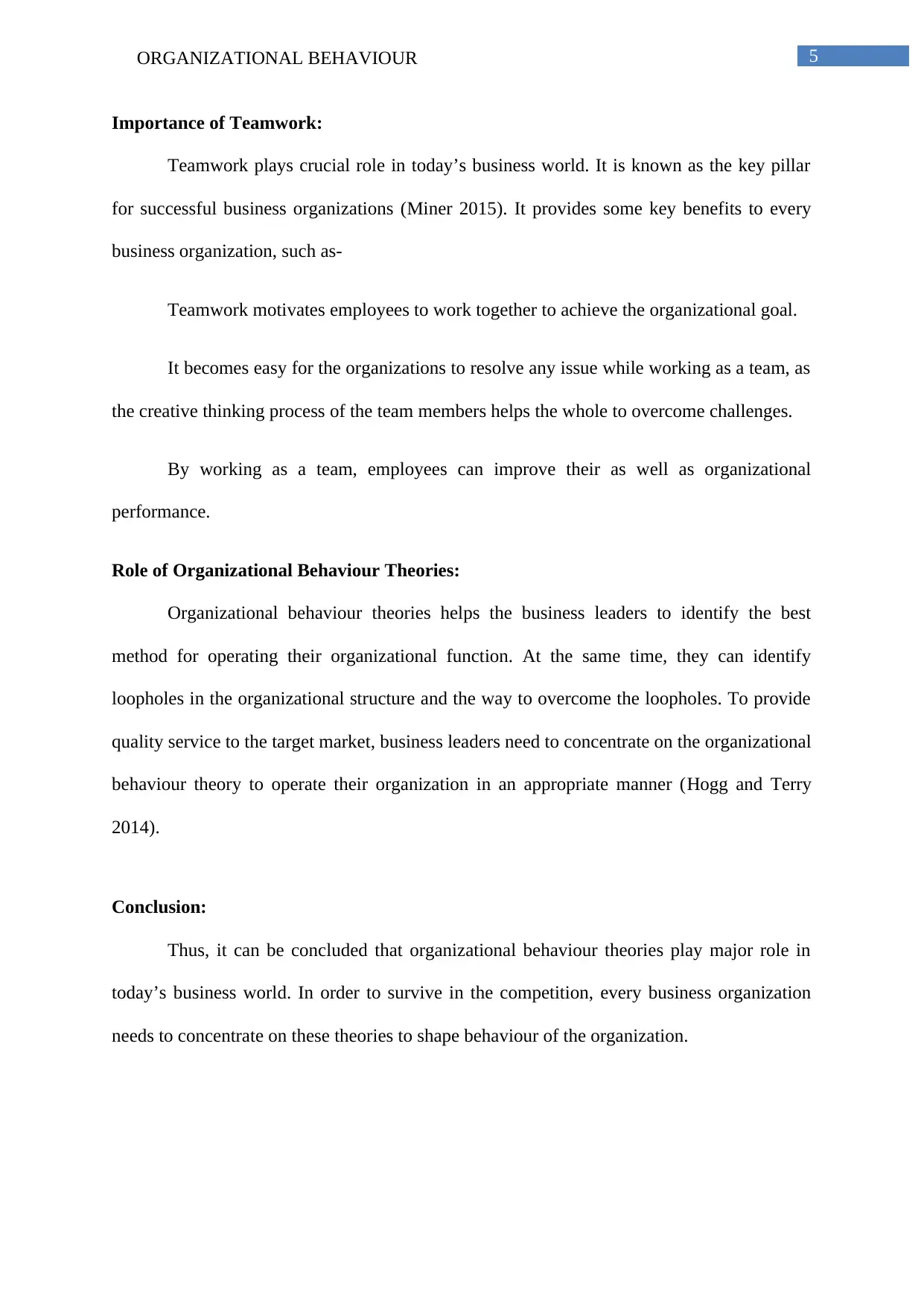
5ORGANIZATIONAL BEHAVIOUR
Importance of Teamwork:
Teamwork plays crucial role in today’s business world. It is known as the key pillar
for successful business organizations (Miner 2015). It provides some key benefits to every
business organization, such as-
Teamwork motivates employees to work together to achieve the organizational goal.
It becomes easy for the organizations to resolve any issue while working as a team, as
the creative thinking process of the team members helps the whole to overcome challenges.
By working as a team, employees can improve their as well as organizational
performance.
Role of Organizational Behaviour Theories:
Organizational behaviour theories helps the business leaders to identify the best
method for operating their organizational function. At the same time, they can identify
loopholes in the organizational structure and the way to overcome the loopholes. To provide
quality service to the target market, business leaders need to concentrate on the organizational
behaviour theory to operate their organization in an appropriate manner (Hogg and Terry
2014).
Conclusion:
Thus, it can be concluded that organizational behaviour theories play major role in
today’s business world. In order to survive in the competition, every business organization
needs to concentrate on these theories to shape behaviour of the organization.
Importance of Teamwork:
Teamwork plays crucial role in today’s business world. It is known as the key pillar
for successful business organizations (Miner 2015). It provides some key benefits to every
business organization, such as-
Teamwork motivates employees to work together to achieve the organizational goal.
It becomes easy for the organizations to resolve any issue while working as a team, as
the creative thinking process of the team members helps the whole to overcome challenges.
By working as a team, employees can improve their as well as organizational
performance.
Role of Organizational Behaviour Theories:
Organizational behaviour theories helps the business leaders to identify the best
method for operating their organizational function. At the same time, they can identify
loopholes in the organizational structure and the way to overcome the loopholes. To provide
quality service to the target market, business leaders need to concentrate on the organizational
behaviour theory to operate their organization in an appropriate manner (Hogg and Terry
2014).
Conclusion:
Thus, it can be concluded that organizational behaviour theories play major role in
today’s business world. In order to survive in the competition, every business organization
needs to concentrate on these theories to shape behaviour of the organization.
⊘ This is a preview!⊘
Do you want full access?
Subscribe today to unlock all pages.

Trusted by 1+ million students worldwide
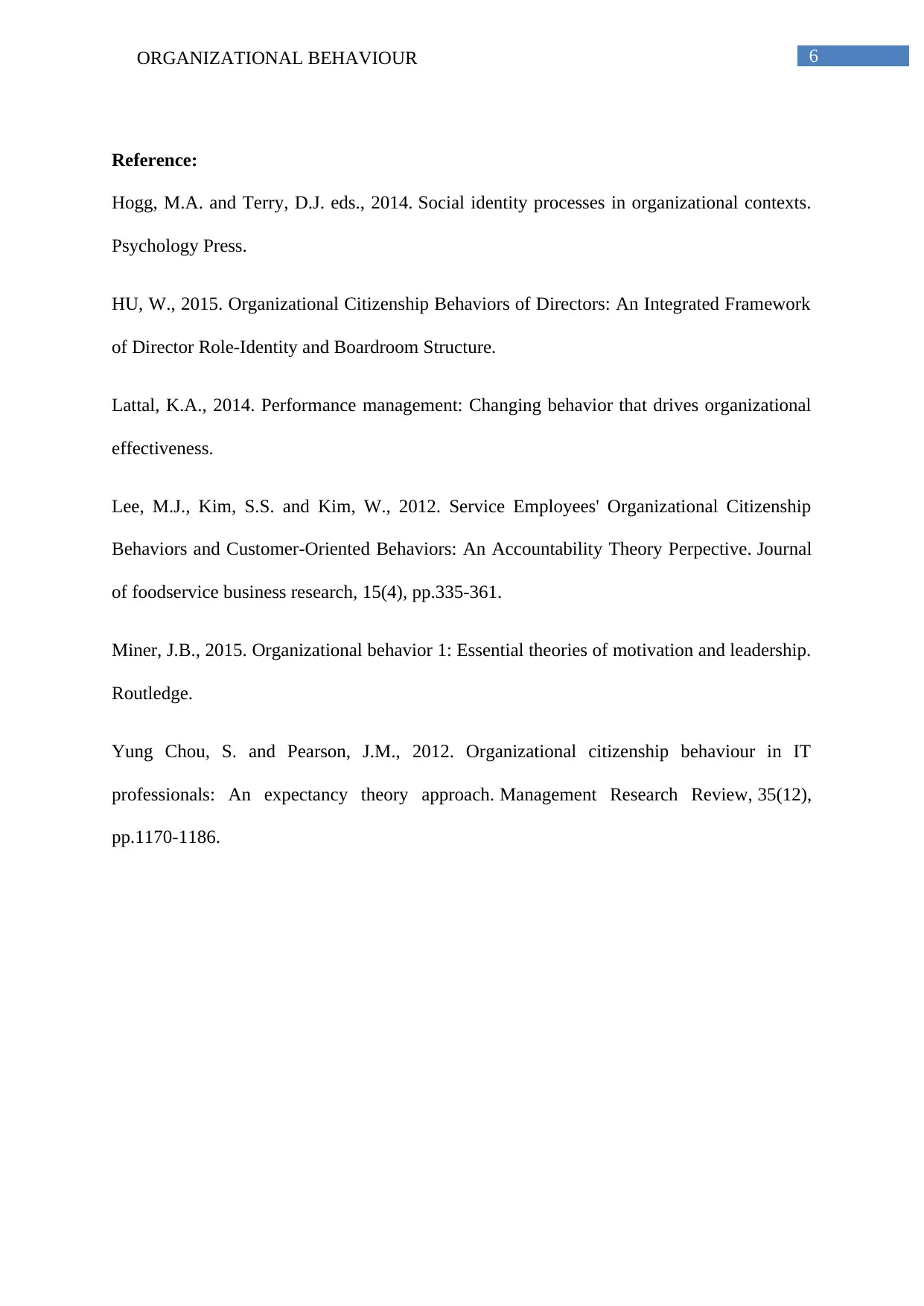
6ORGANIZATIONAL BEHAVIOUR
Reference:
Hogg, M.A. and Terry, D.J. eds., 2014. Social identity processes in organizational contexts.
Psychology Press.
HU, W., 2015. Organizational Citizenship Behaviors of Directors: An Integrated Framework
of Director Role-Identity and Boardroom Structure.
Lattal, K.A., 2014. Performance management: Changing behavior that drives organizational
effectiveness.
Lee, M.J., Kim, S.S. and Kim, W., 2012. Service Employees' Organizational Citizenship
Behaviors and Customer-Oriented Behaviors: An Accountability Theory Perpective. Journal
of foodservice business research, 15(4), pp.335-361.
Miner, J.B., 2015. Organizational behavior 1: Essential theories of motivation and leadership.
Routledge.
Yung Chou, S. and Pearson, J.M., 2012. Organizational citizenship behaviour in IT
professionals: An expectancy theory approach. Management Research Review, 35(12),
pp.1170-1186.
Reference:
Hogg, M.A. and Terry, D.J. eds., 2014. Social identity processes in organizational contexts.
Psychology Press.
HU, W., 2015. Organizational Citizenship Behaviors of Directors: An Integrated Framework
of Director Role-Identity and Boardroom Structure.
Lattal, K.A., 2014. Performance management: Changing behavior that drives organizational
effectiveness.
Lee, M.J., Kim, S.S. and Kim, W., 2012. Service Employees' Organizational Citizenship
Behaviors and Customer-Oriented Behaviors: An Accountability Theory Perpective. Journal
of foodservice business research, 15(4), pp.335-361.
Miner, J.B., 2015. Organizational behavior 1: Essential theories of motivation and leadership.
Routledge.
Yung Chou, S. and Pearson, J.M., 2012. Organizational citizenship behaviour in IT
professionals: An expectancy theory approach. Management Research Review, 35(12),
pp.1170-1186.
1 out of 7
Related Documents
Your All-in-One AI-Powered Toolkit for Academic Success.
+13062052269
info@desklib.com
Available 24*7 on WhatsApp / Email
![[object Object]](/_next/static/media/star-bottom.7253800d.svg)
Unlock your academic potential
Copyright © 2020–2025 A2Z Services. All Rights Reserved. Developed and managed by ZUCOL.




